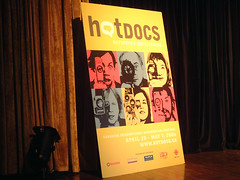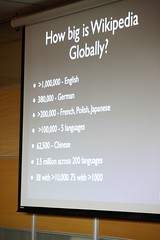Wikipedia, the online world's first free and user-editable encyclopedia, has recently exploded throughout the world. With limited success in the past I'd used
Google.com,
Bartleby.com and
Dictionary.com when doing research. It was on a recent research project where I'd needed the use of a translator (freetranslation.com) and an encyclopedia that I was thrilled to find that
Wikipedia can, to some degree, perform both functions and get me faster results.
Wikipedia is expanding around the globe, people are entering information in
English,
German,
Japanese,
Portuguese,
French and
Polish. Even the tiny country of
Denmark can get their information in
Danish if they want it.
I was turned onto
Wikipedia last winter when I was doing my
election research and was very pleased when all Canadian federal candidates were listed on the site. However the
candidate for whom I was working as a Media Advisor had a dead link (no more information available). Quickly, I pulled together
Rob's bio and did a
wikipedia tutorial on
formatting. Within hours I felt I'd solidified
the candidate's message, given him online presense (the majority of people now do their election research online) and most importantly, increased access to him for those looking online.
Throughout the candidate page I entered my own links - since that is the beauty of
Wiki - and hope that someday all my links will turn from dead end red to boundless blue. I'd encourage you all to jump on board if you have some specific expertise worth sharing. Keep in mind, one important value,
Wikipedia is an encyclopedia, it is not meant for editorial or the expression of beliefs, just the facts. A site is only as good as its weakest link.




